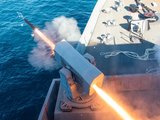USCG orders HC-144 missionisation equipment
TFab Defense Systems (TFD has received a contract from the US Coast Guard to manufacture and deliver Minotaur mission system workstation units for the HC-144B Ocean Sentry medium range surveillance aircraft, the coast guard announced on 31 August.
The units, known as PODs, will be delivered along with aircraft integration kits.
The base award of the contract is worth approximately $7.5 million, which covers production and delivery of 16 Minotaur mission system PODs and eight aircraft integration kits. The full contract calls for up to 32 Minotaur PODs and up to 16 kits for aircraft integration. It has a total value of approximately $15.4 million if all options are exercised.
The POD processes mission data and video, provides communications capabilities and controls aircraft sensors. Each HC-144 will operate with two PODs, which can be detached to accommodate mission requirements.
The Minotaur mission system incorporates the sensors, radar, C4I and ISR equipment that allows aircrew to collect and process surveillance information for transmission to shore and surface operators. The system is being incorporated into the coast guard's fixed-wing surveillance aircraft.
More from Naval Warfare
-
![European navies line up $105.8 billion in unawarded contracts for 2026]()
European navies line up $105.8 billion in unawarded contracts for 2026
France, Germany and Italy lead the way on unawarded naval defence opportunities that could be awarded this year, but across Europe countries are ramping up their spending efforts to face geopolitical challenges.
-
![Spain’s F100 upgrade mirrors Aegis modernisation paths in allied navies]()
Spain’s F100 upgrade mirrors Aegis modernisation paths in allied navies
The Spanish Navy’s Alvaro de Bazan-class of air defence frigates will receive the latest Aegis Weapon System technology among other modernisations to extend the service life to 2045.
-
![UK’s Fleet Solid Support ship programme deemed on track despite steel supply concerns]()
UK’s Fleet Solid Support ship programme deemed on track despite steel supply concerns
Shipbuilders are saying the programme is going ahead on time as the government estimates 7.7 million tonnes of steel are needed for 2026 infrastructure projects.
-
![Raytheon unveils details of its proposal for the US Navy/NATO ESSM Next Significant Variant]()
Raytheon unveils details of its proposal for the US Navy/NATO ESSM Next Significant Variant
In an exclusive interview with Shephard, Raytheon’s VP of Shipboard Missiles disclosed what improvements the company plans to offer for the Sea Sparrow NSV.
























